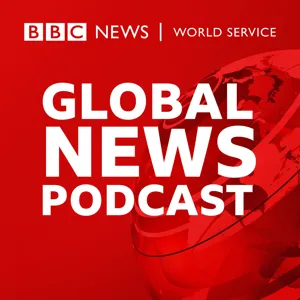Podcast Summary
LinkedIn: A Powerful Hiring Tool for Small Businesses: LinkedIn offers access to a large pool of potential candidates and is more effective for hiring due to users' extended time spent on the site. Innovative banking services, political updates, and affordable furniture deals were also discussed.
LinkedIn is an essential platform for small businesses looking to hire professionals. It offers access to a large pool of potential candidates who may not be actively seeking new jobs but could be open to the right opportunity. Additionally, LinkedIn users tend to spend a significant amount of time on the site, making it a more effective hiring tool compared to other job sites. Furthermore, the podcast discussed various topics including the importance of innovative banking services provided by the Royal Bank of Scotland, the upcoming live podcast recording in Edinburgh featuring former Scottish first ministers, and ongoing political issues in Scotland such as the SNP's finances being investigated and the call for an immediate ceasefire in Gaza. In the commercial segment, listeners were encouraged to check out Burrow for affordable, modular furniture with fast free shipping and up to 60% off during their Memorial Day Sale. Quince was also highlighted for its European linen, premium luggage options, Italian leather bags, and safe and ethical manufacturing practices, all priced at 50 to 80% less than similar brands. Overall, the podcast provided valuable insights on various topics from banking and politics to furniture and travel, making it an informative and engaging listen.
Scottish Labour Party conference: A promising start: Scottish Labour made a strong start at their conference, generating buzz and optimism. Anas Sarwar must establish a clearer lead over the SNP before the May 2026 election.
The Scottish Labour Party conference in late September 2022 was seen as a successful event, generating buzz and morale for the party. Despite past electoral losses to the SNP, there was a sense of optimism and belief that they could form a government at Westminster. However, the critical period for Scottish Labour is between the upcoming general election and the May 2026 holiday election. Anas Sarwar needs to establish a clearer lead over the SNP during this time, as he cannot solely rely on Keir Starmer's leadership at the UK level. The conference was well-executed with minimal mistakes, and the party addressed some tricky issues, such as energy and the upcoming scaza vote. Overall, it was a promising start for Scottish Labour as they aim to mount a serious challenge in the coming years.
Scottish Labour's Distinctive Policies for Scotland: Scottish Labour aims to differentiate itself from SNP with extra borrowing powers, fresh talent initiative 2, and a call for an immediate ceasefire in the Middle East to appeal to Scottish voters and counter the perception of kowtowing to Westminster.
Scottish Labour is making efforts to present distinctive policies for Scotland to differentiate themselves from the SNP and demonstrate their ability to challenge the party in power. Anas Sarwar, the Scottish Labour leader, has announced plans for extra borrowing powers and a "fresh talent initiative 2" for the Scottish parliament, which could be significant if Labour takes control north and south of the border. This comes as a response to the need for distinctive policies to appeal to Scottish voters and counter the perception of kowtowing to Westminster. The historical context of Labour's success in 1997 and the current state of the party's offerings was also discussed, emphasizing the importance of distinctive policies for the party's success. Additionally, Scottish Labour passed a motion at conference calling for an immediate ceasefire in the Middle East, recognizing the need for both sides to comply for a successful and sustained ceasefire.
UK Parliament Debate: Different Approaches and Language from SNP and Labour: The UK Parliament debate on a Middle East ceasefire motion reveals the importance of careful language and the complexity of political dynamics, as the SNP and Labour have contrasting approaches and historical issues impacting their positions.
The ongoing debate in the UK Parliament regarding a motion calling for a ceasefire in the Middle East has become politically charged, with the SNP and Labour Party having different approaches and language. The SNP's motion includes the term "collective responsibility," which Labour, led by Keir Starmer, cannot support due to their historic and present issues with anti-Semitism and the potential breach of international law. The SNP's motion also seeks to create universal support but may be more about politics than substance. The Scottish context adds complexity, as Scottish Labour passed a motion with the term "collective punishment," which further complicates the situation. Ultimately, the importance of words and careful language is highlighted, as the UK, despite not being the key player in the Middle East, still holds significant influence and responsibility.
UK Parliament debates Gaza crisis, but humanitarian focus risks getting lost: Political debates in UK Parliament over Gaza crisis may distract from urgent humanitarian issue, potentially harming Labour's relationship with Muslim voters
The ongoing political debates in the UK Parliament regarding the situation in Gaza will have little immediate impact on the humanitarian crisis unfolding there. The discussion around the vote, while important politically, risks losing sight of the urgent humanitarian issue at hand. The SNP and Stephen Flynn are capitalizing on the situation, but the overarching message to the public may be that Keir Starmer does not support a ceasefire motion, which could negatively impact Labour's relationship with Muslim voters. It is crucial for all political parties to maintain focus on the humanitarian crisis and avoid overdoing political gains. Scottish Labour, with its distinct stance on the issue, may emerge relatively unscathed.
Scottish Affairs Committee Discussion and Business Backlash: Controversy over energy policies led to a business backlash against Keir Starmer, while the debate focuses on net zero emissions, protecting jobs, and global leadership in green energies.
During a House of Commons Scottish Affairs Committee session, Alex Salmond discussed the relationship between the Scottish and UK governments. Meanwhile, Hamza Yusuf's visit to Aberdeen, focusing on energy, caused controversy due to his stance against Labor's proposed windfall tax increase and investment allowance removal. This led to a significant backlash from businesses in the northeast of Scotland, with over 1,000 business leaders signing an open letter urging Keir Starmer to reconsider. The real debate, however, centers around the best approach to achieving net zero emissions, protecting necessary skills and jobs, and making Scotland a global leader in new and green energies. The windfall tax and investment allowances are just parts of the larger discussion.
Political instability hinders investment in renewable energy: Industry calls for a 10-year fiscal framework to provide certainty and stability for energy investment, as political inconsistency and lack of consultation hinder investment in renewable energy technologies, particularly for supply chain companies.
The energy industry is facing significant uncertainty due to political instability and lack of consultation, which is deterring investment in new green technologies. This uncertainty is particularly impacting supply chain companies that are trying to diversify into renewable energy sources like green hydrogen. One company has even had to mothball a £30 million investment in a new R&D facility due to the current climate. Industry leaders are calling for a 10-year fiscal framework to provide certainty and stability for investment decisions. The lack of consistency and consultation is a major concern, and the industry feels that politicians have been inconsistent and even dishonest in their statements regarding energy policy. The industry believes that hydrocarbons and renewables are two sides of the same coin, and that efforts to diminish profits in the hydrocarbon sector will negatively impact investment in renewables. It is crucial that the main political parties agree on a basic ground rule for the energy transition, recognizing the interconnectedness of hydrocarbons and renewables.
Political messaging around energy profits and taxes: Raising taxes on oil and gas companies without considering consequences could deter investment and hinder progress towards net zero emissions. Shell's renewable energy and carbon capture initiatives require oil and gas revenues for funding.
The current political messaging around energy profits and taxes can be confusing and misleading. Shell, as an example, is a successful company investing in renewable energy and carbon capture, but these initiatives aren't yet available at scale. To fund these transitions, oil and gas revenues are crucial for the supply chain and SMEs. Raising taxes on companies without considering the potential consequences could deter investment and hinder progress towards net zero emissions. The Labour Party's criticism of the SNP regarding taxation on oil and gas companies versus workers might seem contradictory, but the two issues aren't mutually exclusive. The population is growing increasingly frustrated with politicians for using misleading messages to gain votes during election years. Additionally, BBC Scotland's plans to scrap hour-long TV news programs like The 9 and The Edit could impact the media landscape and potentially limit diverse perspectives.
BBC Scotland Drops Nightly News, Introduces Podcast Series: BBC Scotland discontinues nightly news and launches podcast series to address concerns of Scottish representation and competition in media landscape, focusing on improving existing platforms and creating more opt-outs instead of new channels.
The BBC Scotland channel is discontinuing its nightly current affairs program, "BBC Scotland Nine O'Clock News," and replacing it with a 30-minute news program and new topical current affairs podcast series. This decision comes amidst criticism and concerns about the lack of Scottish representation and devised content on the channel, especially in comparison to STV's broader coverage of issues across Scotland. The speaker also emphasized the challenges of competing with the abundance of entertainment options available to viewers in the current media landscape. Despite the controversy, the speaker suggested focusing on improving Scottish content on existing platforms and creating more opt-outs rather than attempting to create new channels. The demise of BBC Scotland Nine O'Clock News is a reminder of the importance of representing and addressing the needs and interests of diverse regions within media platforms.
BBC Scotland's Balancing Act: Scottish vs UK Content: Speakers discussed the challenges of balancing Scottish and UK content on BBC Scotland, emphasized the need for impartiality and inclusivity, and suggested a more sustainable funding model for the BBC.
The BBC's efforts to balance Scottish and UK content on BBC Scotland have been an ongoing challenge for many years. Despite having good people and resources, the broadcaster has struggled to encourage viewers to shift to a different channel for their news and current affairs content. The issue is further complicated by the need for impartiality and constitutional discussions. The recent changes aim to address these challenges, but it remains to be seen how long they will last and what comes next. The speakers also suggested that the BBC could better utilize its assets in different regions and ensure local issues are covered in a more inclusive way. Additionally, they emphasized the importance of maintaining a UK element in the coverage. Ultimately, the speakers agreed that the current funding model for the BBC is not sustainable and that viewers should have the choice to pay for the content they value.
Impact of BBC on Media Landscape: The BBC's existence as a free, publicly-funded broadcaster has influenced the media landscape, potentially benefiting from a shift towards subscription funding and clearer goals for both the BBC and other media outlets.
The existence of the BBC as a free, publicly-funded broadcaster has significantly impacted the media landscape, particularly the printed press and regional media, by providing free access to news and information. The speaker suggests that a shift towards a subscription model for BBC funding could benefit both the BBC and other media outlets by providing clearer goals and less encumbrance from taxpayer funds. Additionally, during a Scottish Affairs Committee hearing, former First Minister of Scotland Alex Salmond discussed his tenure and the relationship between the Scottish and Westminster governments, offering insights into intergovernmental relations and the history of devolution in Scotland. Salmond's appearance was notable for his commentary on various topics, including the handling of messages during the COVID-19 pandemic and his perspective on the functionality of the relationship between the two governments. Overall, the discussion highlighted the importance of understanding the role of public broadcasting in the media landscape and the ongoing evolution of intergovernmental relations in Scotland.
Formalizing intergovernmental relations for effective governance: Formalizing intergovernmental relations can lead to effective governance, but the same party in power in Edinburgh and London might hinder it. Importance of formalizing relations and risks of informal arrangements.
That the formalization of intergovernmental relations between different parties in control of devolved and reserved areas can lead to more effective governance. However, the opposite might be true if the same party is in power in both Edinburgh and London. This insight was shared during a recent session featuring a former Scottish government advisor, which left the speakers reflecting on the potential implications for the upcoming Scottish elections and the possibility of a Labour government in control in both Scotland and Westminster. The speakers also noted the importance of formalizing intergovernmental relations and the potential risks of informal arrangements leading to opacity and difficulty in governing complex issues. This topic will be further explored in the upcoming 25th anniversary podcast of Hollywood Sources.
Unique solutions for different needs: UnitedHealthcare TriTerm Medical Plans and 1-800-Flowers: UnitedHealthcare TriTerm Medical Plans offer flexible, affordable health insurance for those in transition, while 1-800-Flowers delivers smiles through thoughtful gifts and services
Both UnitedHealthcare TriTerm Medical Plans and 1-800-Flowers offer unique solutions to meet different needs. UnitedHealthcare TriTerm Medical Plans provide affordable and flexible health insurance options for those in between jobs or missed open enrollment, with coverage lasting nearly 3 years in some states and access to a nationwide network of doctors and hospitals. On the other hand, 1-800-Flowers goes beyond being just a gift-giving destination. They put heart and love into every product and service they offer, helping people celebrate all life's special occasions with friends and family. From farmers and bakers to florists and makers, everything from 1-800-Flowers is made with care to deliver smiles.




